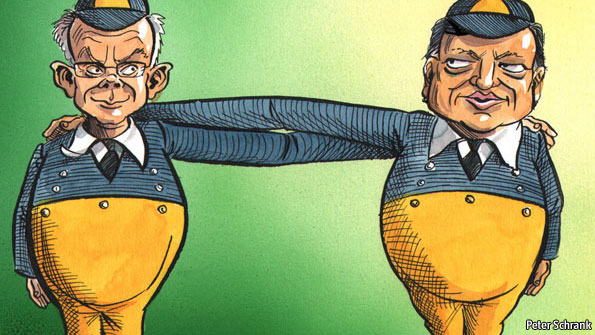
From Charlemagne, the Economist: Last year’s Lisbon treaty, promoted as a means of making the EU more efficient, has in fact made this divide permanent by creating a second figurehead for Europe. Alongside the president of the European Commission, José Manuel Barroso, there is now Herman Van Rompuy, president of the European Council. Like the double-headed eagle adopted by European emperors since Byzantine times, the EU now tries to act as one body with two heads. At global gatherings, the Portuguese Mr Barroso and the Belgian Mr Van Rompuy sit side-by-side, speaking into one microphone. At the most recent G8 summit, Mr Van Rompuy took the lead; at the G20 Mr Barroso did most of the talking. This odd double-act will go on through a series of summits with the likes of China, India, Russia and the United States. Will these countries finally take the EU seriously? Or will leaders such as Barack Obama despair of Tweedledum and Tweedledee?
There is a nervousness about both men. Mr Van Rompuy is seeking a role beyond chairing EU summits. Mr Barroso is unsure about how to adapt to his neighbour. The two presidents are too experienced to betray any ill feelings. They meet for breakfast almost weekly. Both were serving prime ministers when they were called to Brussels. Both belong to the broad centre-right European People’s Party. Mr Van Rompuy insists he has no desire to encroach on Mr Barroso’s authority. …
Both men confront paradoxes. The commission has more authority across Europe, but is weaker in Brussels. The council is stronger, but Mr Van Rompuy must rely on the commission’s big bureaucracy to get much done. Such contradictions are apparent in the debate over the euro. Mr Van Rompuy was asked to lead a task force to propose ways of strengthening economic “governance”, irking Mr Barroso (and Jean-Claude Juncker, Luxembourg’s prime minister, who presides over the euro group of finance ministers). Yet most measures being considered by Mr Van Rompuy were proposed by the commission. The commission worries that the task force will not press for tough enough action. It plans to publish its own proposals next week, partly to assert its right to legislative initiative.
The commission believes that, as an appointed body insulated from day-to-day political pressures, it is best placed to judge the collective interest. Had it not resisted protectionist measures in the crisis, say officials, the single market would have collapsed. One commission insider asserts that “the commission can be free of populism…democracy is not just elections but the rule of law. Courts are not elected, but they are legitimate.” Even Germany, he says, “cannot say to France what we are saying to France.” (graphic: Peter Schrank/Economist)
Image: economist%209%2024%2010%20von%20Rompuy%20Barroso.jpg
